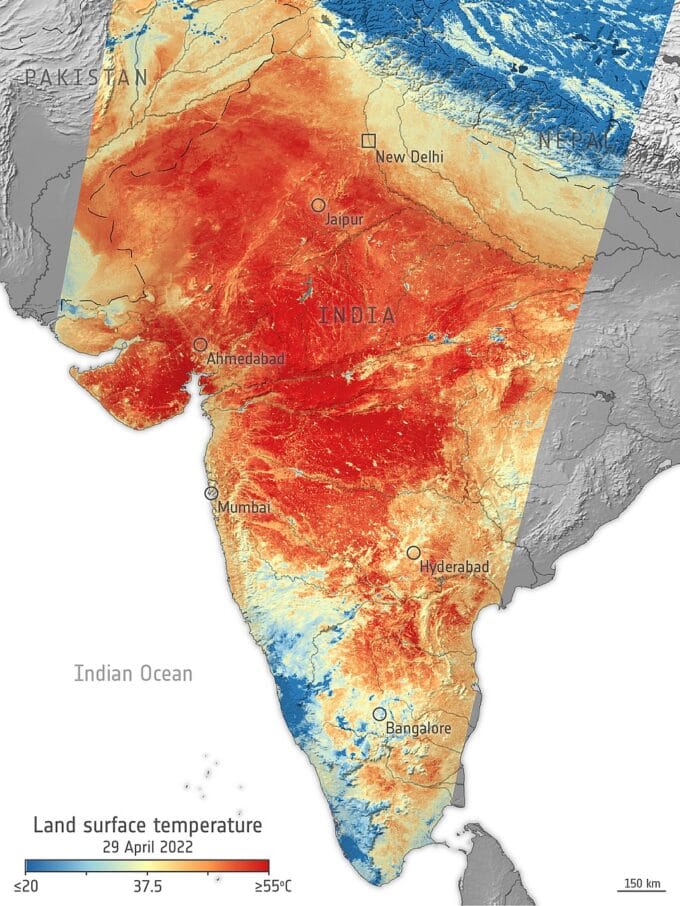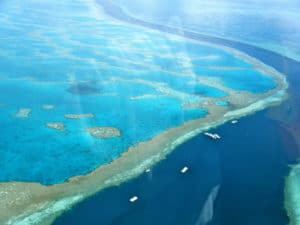
A Letter from India
By Robert Hunziker
A letter from India, which follows below, was received in response to the posted article India – Birds Drop From the Sky, People Die (May 24th). The letter is a personal testament to weakened ecosystems caused by global warming and human recklessness.
In point of fact, there’s just no getting around the evidence that the Anthropocene, which is the current geological age of human dominance, carelessly, relentlessly undermines foundations of life-supporting ecosystems.

The normally robust Great Barrier Reef is halfway gone in only 25 years ever since a series of mass coral bleaching started in 1998 at the same time as the spectacular Amazon rainforest now emits more CO2 than it absorbs in some regions of the gigantic rainforest (confirmed in 2021) at the same time as only 10% of large predatory fish remain in the oceans since 1950.
Earth pre-WWII is not Earth post-1945, when world population tripled within merely a finger-click of geologic time on the world stage for all to see like a watermelon moving through a snake; it stands out.
In fact, with healthy climate systems, coral reefs that stood the tests of time over millennia do not suddenly die in only 25 years; all-powerful rainforests do not suddenly start emitting more CO2 into the atmosphere than they absorb and the oceans, over time immemorial, do not suddenly lose 90% of large predatory fish stock in only 70 years.
None of that happened for thousands of years. But, a feverish climate system is something altogether different as the pillars of strength, the building blocks of the planet, weaken right before civilization’s eyes. The planet’s crucial ecosystems did not fail over the course of the past ten thousand (10,000) years but thrived in an ultra-forgiving not too hot, not too cold Goldilocks environment called the Holocene Era. What’s changed?
The climate has changed. Human input via excessive greenhouse gases like CO2 from cars, trains, planes and factories and power plants changed the climate, which is sadly worse than the worst predictions of scientists of only a few years ago.
According to State of the Climate in 2020 by the National Oceanic and Atmospheric Administration (NOAA) “the planet is in worse shape than ever.”
“Climate change is widespread, rapid, and intensifying.” (IPCC)
“The 1.5-degree goal is on life support. It is in intensive care.” (António Guterres, U.N. Secretary General)
On May 24, 2022 India-Birds Drop Out of the Sky, People Die posted on social media. Two days later, a letter written by Pradeep Nair addressed the issues by referencing an utterly failed ecosystem in a region of India. Pradeep’s letter tells a story that needs to be told. It is a forewarning for neighboring regions, countries, and the world at large. It opens closed eyes.
Pradeep’s letter, verbatim:
Dear Robert,
Your article reads well. Thank you.
I am in the western Indian state of Maharashtra. The heat here is oppressive, as it is elsewhere across the country.
It wasn’t this bad just over a decade ago. What is alarming is that the change for the worse may be happening faster than we are willing to acknowledge. I think it changed in less than a decade, maybe five years.
Last month I had been to my parents’ home in the southern Indian state of Kerala, a tourist destination called God’s Own Country for its natural beauty.
The entire month (March-April) I was there it was hot as hell and so humid that I had boils all over my body. To add to that, untimely rains ruined our paddy crops. We usually cultivate rice in Kerala before the South Western Monsoons arrive in June.
This time the untimely rains washed away one attempt at cropping and the second time the seeds didn’t germinate at all. Elders in my family said that had never happened before.
About 25 years ago, we had moved to my home village in Kerala for a few years. A tributary of the Meenachil River (mentioned in Arundhati Roy’s Booker-winning book ‘God of Small Things’) flows by our house and we used to bathe in its water. There were plenty of fish too then.
Now the water is so dirty, greenish and full of organic matter that we don’t even dip our feet in it for fear of skin irritation. Many fish species have vanished completely.
Some time back I had seen the odd catfish stand still in the shallow waters. You could catch them with your bare hands and they won’t move because their gills or tails had rotted and were falling off. I saw some reports about the disease affecting fish. But nothing much.
It is sometimes very frustrating how we ignore the little warning signs Nature gives us.
Wish you well and stay blessed.
Pradeep Nair, Satara, Maharashtra, India
Pradeep’s statement: “It is sometimes very frustrating how we ignore the little warning signs Nature gives us” comes back around larger than ever to haunt every single person on the planet when the world’s biggest, mightiest, strongest, most vital ecosystems like the Amazon rainforest and the Great Barrier Reef lose 10,000 years of magnificent resplendence.
Solution: Stop burning fossil fuels.
Based in Los Angeles, Robert Hunziker is a freelance writer and environmental journalist whose articles have been translated into foreign languages and published in over 50 journals, magazines and sites worldwide.
Robert Hunziker can be reached at rlhunziker@gmail.com.
This article was originally published on June 1, 2022 © Counterpunch